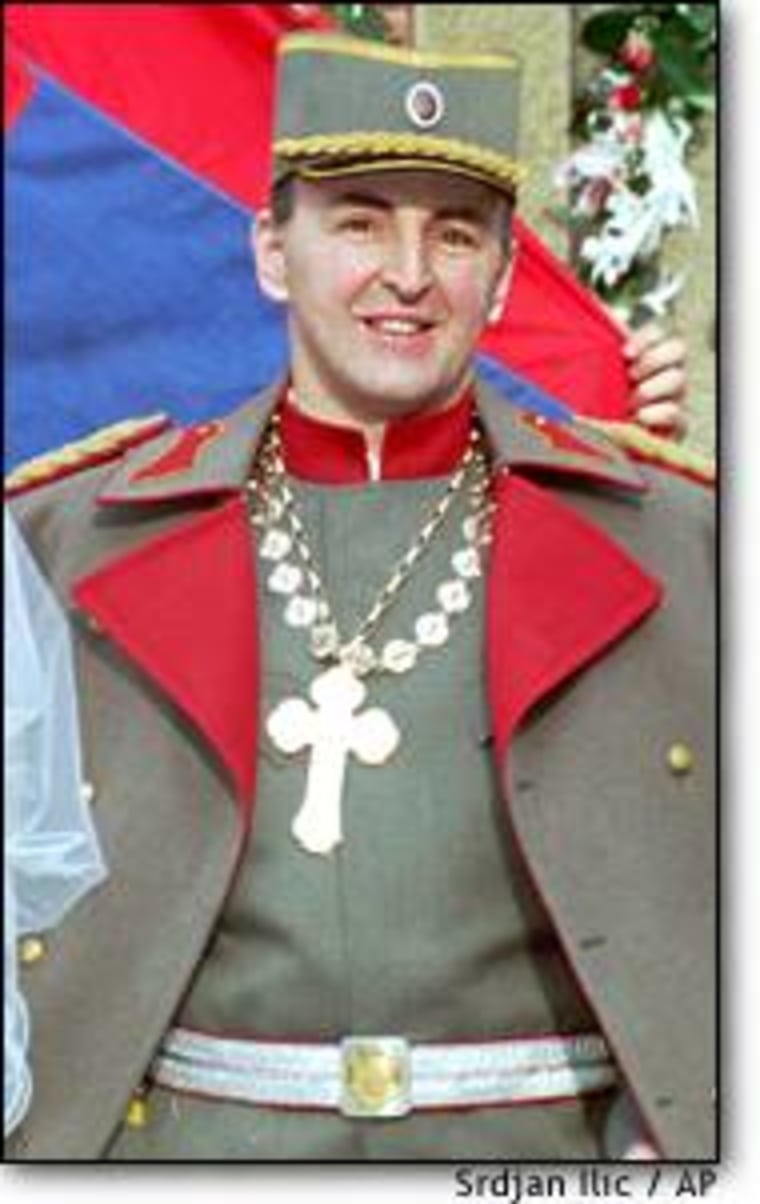In the end, alleged Serb war criminal Zeljko “Arkan” Raznatovic was downed where he felt safest — in the posh Intercontinental hotel in Belgrade. It was in this same lair that I came to know him last year during a dozen meetings and encounters amid NATO’s war on Yugoslavia.
Raznatovic, for lack of a better word, charming. Clean-shaven, handsome with steely blue eyes and an expensive dresser, he did look the image of legitimate businessman he so desperately wanted to project.
He confessed a weakness for Armani clothes. His shoes were Hugo Boss. He drove a black Chevy Yukon with his young wife at his side and two or three burly bodyguards in back.
But Raznatovic had a dark side that international war crimes investigators tried to shed light on for years. In September 1997, the tribunal in The Hague indicted him for his role in the Croatian and Bosnian wars — but kept the indictment secret until last year. While details of the charges still are not fully known, Raznatovic was likely fingered for his role in the 1991 massacre of 250 men taken from a hospital in Vukovar, Croatia, as well as for his leadership of Arkan’s Tigers, the paramilitary group he led during both wars.
A TRUE MEDIA HOUND
But last March, Raznatovic was anything but worried. He sat in a booth in a bar at the Intercontinental in Belgrade and called me and my colleagues over for a drink. Raznatovic was, as we say, a media hound. Just a few days before, NATO had hit targets around Belgrade during the beginning of its air war against Yugoslavia. Most journalists had fled the capital or been expelled by police in the middle of the night. Raznatovic was looking for an outlet for his rage.
He was profane, but coy enough to swear only off-camera. “NATO can expect hell. I promise them,” he said. “We will fight with everything we have … until the last man. It’s an honor for me as a soldier to die fighting in Kosovo.”
A week into NATO’s campaign, the Yugoslav government wasn’t talking. Reclusive President Slobodan Milosevic was nowhere to be seen. A near vacuum of power below him made journalists scramble for any kind of reaction to the bombings. We found that in Raznatovic, who was one of the most articulate proponents of the government’s policy of ethnic cleansing in Kosovo. And he did it in fluent English.
AN INTERNET FIRST
Raznatovic liked to talk. He became the first suspected war criminal to chat live on the Internet. Even when nobody wanted him for an interview, he made himself available. Twice during that period he knocked on the door of my hotel room just to make sure I wasn’t writing anything that he could “help” with.
Raznatovic liked bear hugs. Eyeing the bulges in his bodyguards’ coats, I found it hard to refuse.
After one interview with NBC News failed to run because of a time constraint in the show, Raznatovic was infuriated. “You wasted my time,” he said.
The next day, the tribunal in The Hague unsealed its indictment against him. I called him for a reaction. “So, today I am a war criminal,” he said casually. He again denied orchestrating or participating in the massacre of Croatian and Bosnian Muslim civilians, but stood up for the paramilitary Tigers. “We were defending our country. We were defending Serbia.”
Later, when NBC’s “Today” show came calling, Raznatovic demanded more time on air. In a 10-minute interview with Matt Lauer, he again defended his fighting in Croatia and Bosnia. “That son-of-a-bitch Matt,” he told me after the interview. “He cut me off.”
Before the interview, Raznatovic’s wife, Ceca, the country’s best-known folk singer, dabbed makeup on her husband. “I brought her to make me beautiful,” he said.
NO PROBLEM WITH POPULISM
When he left the television station, dozens of staff members gathered and clapped and cheered as he walked through. Raznatovic said what many Serbs, besieged by years of economic sanctions and then under NATO air attacks, wanted to hear.
He told NATO to get out. He promised, in the event of a ground war, to fight NATO with his bare hands. With President Milosevic seemingly allergic to populism, Raznatovic touched the people. He joined anti-NATO rallies in the middle of the city, acting more like a politician than an indicted war criminal also wanted by Interpol for a string of robberies across Europe.
The Belgrade rumor mill is full of reasons for Raznatovic’s assassination. As with anything in the upper echelons of Yugoslav power, his death was likely a combination of politics and money.
The joke among journalists was that Raznatovic would not last long after the NATO bombing campaign. When the Yugoslav air defenses downed a U.S. F-117 Stealth fighter early in the war, Raznatovic took to carrying a small piece of the aircraft’s secret wing in his wallet.
What Raznatovic may have never known was that the slice of the aircraft’s wing was likely toxic — and he carried it right over his heart.
“Then I can throw it on the ground and step on it whenever I want,” he said. “It’s like stepping on NATO.”
